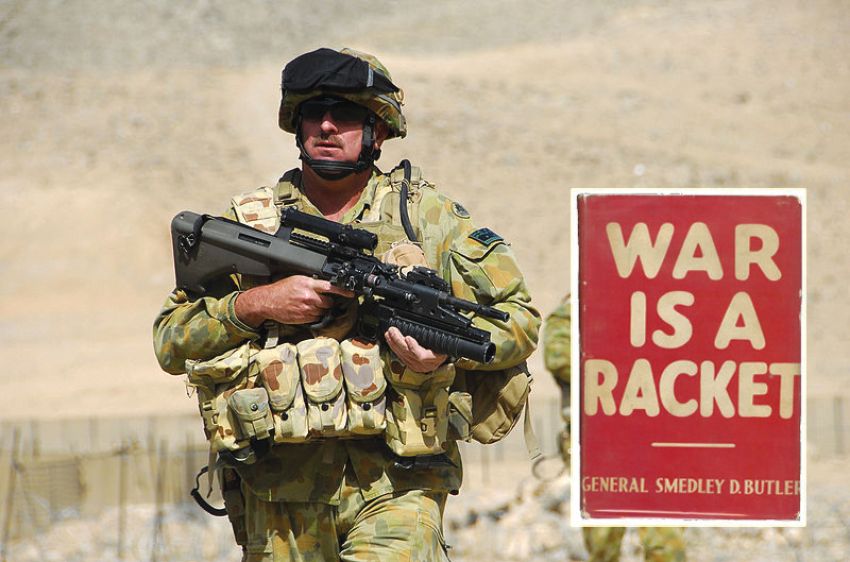
There’s plenty to reflect on in the lead-up to ANZAC Day. For some, including several of the past surviving soldiers from World War II who became outspoken anti-war activists, April 25 is a day to interrogate, not laud, Australia’s participation in war.
Over the last few days, new allegations about the brutal behaviour of Australian special forces officers in the war on Afghanistan have emerged.
It appears that many officers took part in the cruelty. The Age, The Sydney Morning Herald and 60 Minutes have published images allegedly found in a plastic container in the garden of Australia’s most decorated corporal, Ben Roberts-Smith.
The images show at least one of these elite soldiers dressed in a Ku Klux Klan outfit holding up a noose, and others drinking from a war trophy — the prosthetic leg of an alleged Taliban fighter.
In an effort to stop whistle blowers, Roberts-Smith is suing the media, with the support of media magnate and his boss Kerry Stokes, who also happens to be the Australian War Memorial chair.
Information previously leaked by whistleblowers led to the Inspector-General of the Australian Defence Force authorising an investigation. The highly redacted Afghanistan Inquiry by Major General Paul Brereton, released last November, looked into the conduct of Australia’s special forces, including the alleged murder of 39 Afghan people.
But since then, nothing much seems to have happened. A special investigations office was set up last December, but it apparently still lacks investigators. A Senate estimates meeting was told that finding the right people had proven difficult.
A culture of secrecy has prevented the truthful reporting of Australia’s precise role in the long-running Afghanistan war. Since 2001, only embedded journalists were allowed to enter the country and, typically, the reports centred on how “our” valiant soldiers were needed by the United States-led “anti-terrorist” effort to bring democracy.
The propaganda was pitched at a very low level, but the 9/11 attacks had conjured an atmosphere in which the quest for revenge had been accepted. Racism also played a big part.
As the war dragged on, and the Western alliance added Iraq to the list of “terrorist-supporting” countries, questions started to be raised about the war’s “end goal.” Democracy and women’s rights were nowhere to be seen and war weariness had started to set in as increasing numbers of US soldiers were returning from Iraq and Afghanistan in body bags.
Traumatised returned US troops started to organise and tell the truth about the mission. Australian soldiers were initially reluctant to speak out, due perhaps to the comparatively small numbers of troops sent by Australia to Afghanistan.
But now some are. David McBride, a former military lawyer, has put his neck on the line. He faces 50 years in prison if found guilty of blowing the whistle on the “unethical, harmful and highly politicised leadership which fostered a culture of impunity in Afghanistan”.
If everybody who has knowledge about what happened in Afghanistan stays silent, no charges can be laid due to a lack of evidence.
Last year Brereton recommended that charges be laid on those found guilty of killing civilians or the summary execution of detainees. “None of these are incidents of disputable decisions made under pressure in the heat of battle,” Brereton said.
Prime Minister Scott Morrison did not agree. And now he has given Peter Dutton, a former cop renowned for his cruelty, the defence portfolio. Dutton has rushed to assure the ADF that he “has their back”.
Meanwhile, former Liberal defence minister Christopher Pyne is beating the drums of war against China, while making a living as an arms industry lobbyist. His deputy Andrew Hastie has told military personnel thattheir “core business” will always be the “application of lethal violence”. And the Labor opposition recently committed to further boosting Australia’s growing arms industry and maintaining the US-Australia war alliance at its policy conference.
The stakes are high.
An antidote to the imperialists’ patriotism is Major General Smedley Butler, whose 1935 book War Is A Racket, is well worth a read. He was the most decorated marine in US history but, by World War I, was considered too “unreliable” to be sent to the front. He later spelled out that war was simply a “racket” to make profits.
‘War is a racket. It always has been.
‘It is possibly the oldest, easily the most profitable, surely the most vicious. It is the only one international in scope. It is the only one in which the profits are reckoned in dollars and the losses in lives.
‘A racket is best described, I believe, as something that is not what it seems to the majority of the people. Only a small “inside” group knows what it is about. It is conducted for the benefit of the very few, at the expense of the very many. Out of war a few people make huge fortunes.’
If you want to help Green Left continue to oppose imperialist wars and stop others, become a supporter and make a donation to our 2021 Fighting Fund.